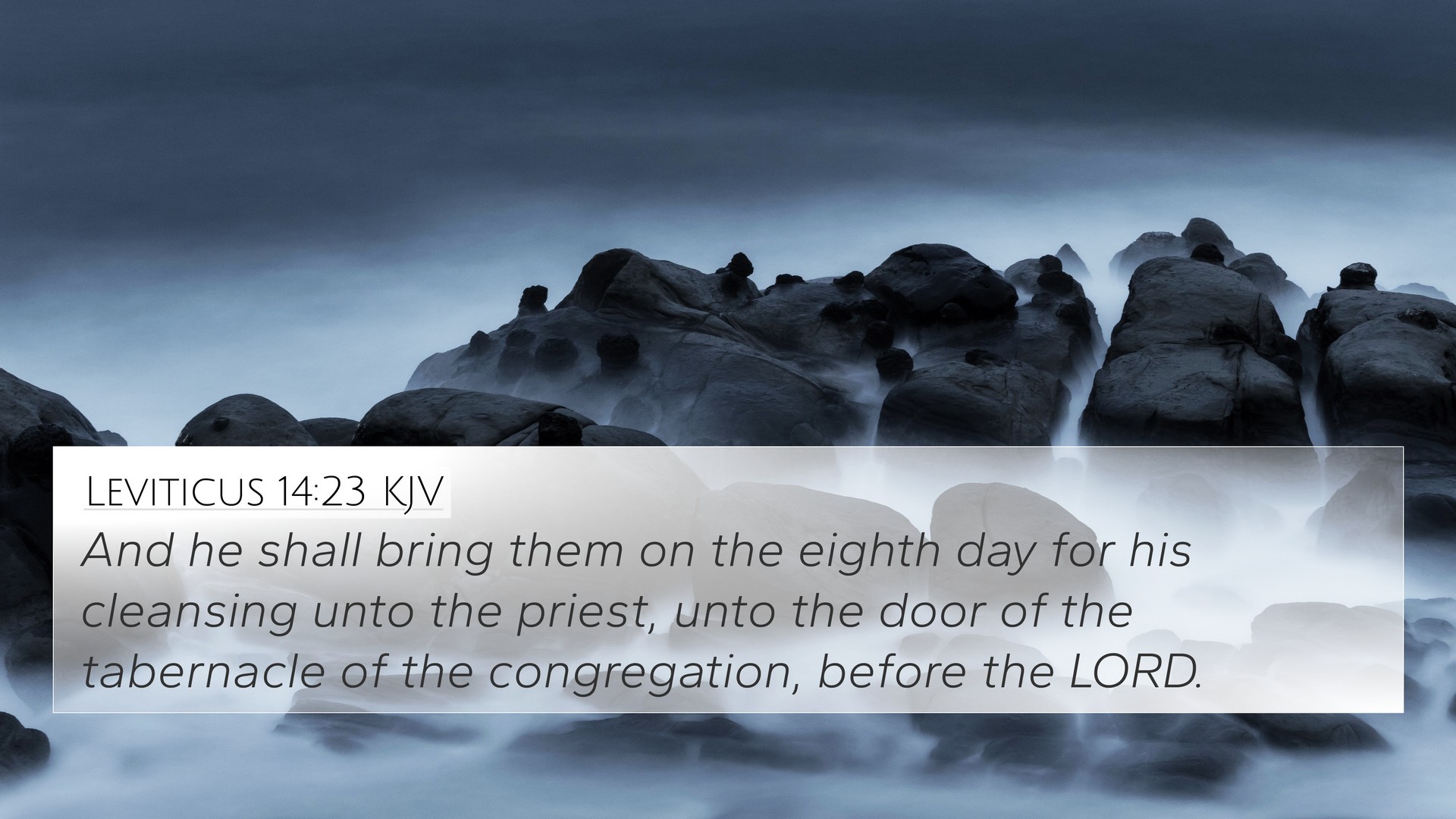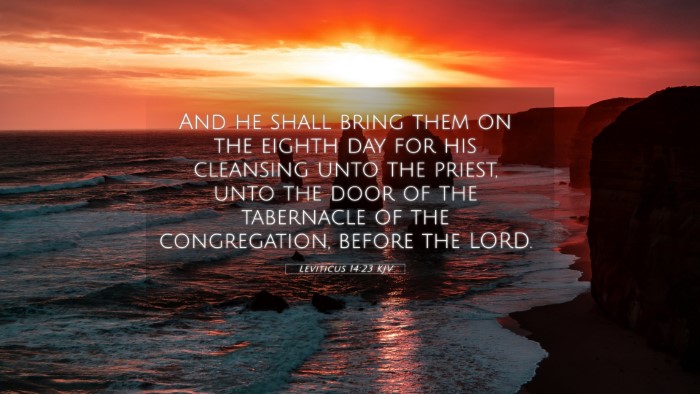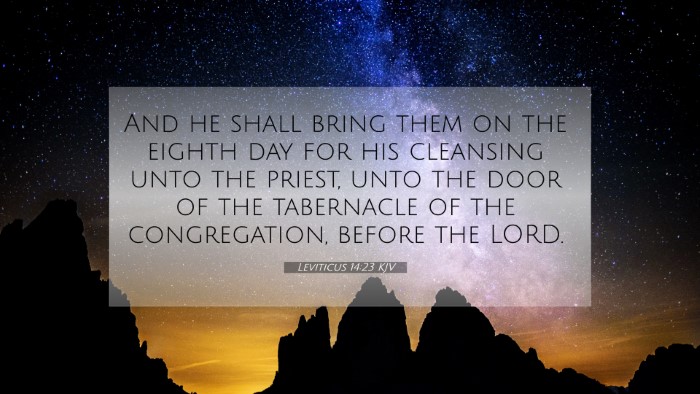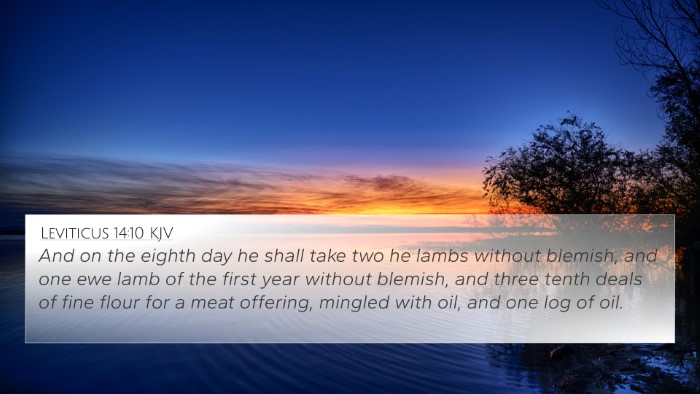Meaning of Leviticus 14:23
Leviticus 14:23 states, "And he shall bring it to the priest, who shall offer it before the Lord, at the entrance of the tent of meeting." This verse is part of the laws regarding the cleansing of lepers, showcasing the meticulous procedures ordained by God for maintaining purity in the community of Israel.
Context and Significance
The chapter outlines a ceremonial cleansing process for individuals who have been healed of leprosy, a condition seen not just as a physical ailment but also as a source of ritual impurity. The requirement for the afflicted to present themselves to the priest underscores the importance of priestly mediation in approaching God, which is a common theme throughout the Pentateuch.
Commentary Insights
-
Matthew Henry:
Matthew Henry explains that the act of bringing the offering to the priest emphasizes the principle that reconciliation with God requires mediation. The priest’s role signifies God’s acceptance once the prescribed rituals are observed, highlighting the theme of atonement prevalent throughout Scripture.
-
Albert Barnes:
Albert Barnes adds that the phrase "before the Lord" indicates that the sacrifice is presented to God’s presence, reinforcing the idea of sacredness involved in these rituals. This also signals God’s desire for holiness in His people, and that coming into His presence must be approached with reverence and proper procedure.
-
Adam Clarke:
Adam Clarke emphasizes the spiritual implications of the act. He notes that just as leprosy represents sin and separation from God, the process of cleansing symbolizes the restoration of relationship with God. This backward glance towards ceremonial law foreshadows Christ’s ultimate sacrifice for humanity's sins.
Bible Verse Cross-References
- Leviticus 13:9-11 - Laws concerning leprosy.
- Exodus 28:1 - Priests as mediators.
- Hebrews 9:22 - Without shedding of blood, there is no remission.
- Numbers 19:1-10 - Purification laws connected to the red heifer.
- Matthew 8:2-3 - Jesus healing a leper and fulfilling the law through His actions.
- Mark 1:40-45 - The importance of obedience to the Law through a healed leper's actions.
- 1 Peter 2:9 - A royal priesthood, paralleling the call of Israel.
- Romans 12:1 - Presenting oneself as a living sacrifice, similar to offerings.
- Leviticus 16:10 - The Day of Atonement and the concept of cleansing.
- Colossians 1:20-22 - Being reconciled through sacrificial blood.
Thematic Bible Verse Connections
-
Understanding leprosy in Leviticus in relation to sin parallels how sin isolates individuals from God (Isaiah 59:2).
-
Connecting Leviticus 14:23 with the New Testament concepts of purification and redemption in Christ strengthens the narrative of redemption across covenants.
-
The link between the ceremonial cleansing of lepers and the ultimate healing found in Christ illustrates the continuity of God's redemptive plan.
-
The usage of blood in both the Old Testament sacrificial system and the New Testament conveys the significance of Jesus' blood in establishing the New Covenant (Luke 22:20).
-
The emphasis on presentation before God reflects the holistic relationship between humanity and divinity, reiterating the call to live a life pleasing to God (2 Corinthians 5:9).
Conclusion
Leviticus 14:23 serves as a critical point in understanding the principles of ceremonial cleansing, priesthood, and the overarching theme of atonement in the Bible. It demonstrates how inter-Biblical dialogue facilitates a deeper understanding of God's covenant with His people, reinforcing the necessity of clean hearts and a sincere approach to worship.
Learning to find Bible cross-references enhances one’s understanding of connections across the Old and New Testaments. Bible cross-reference guides can serve as valuable tools in navigating thematic connections between scripture, illuminating the intricate tapestry of God’s word.



